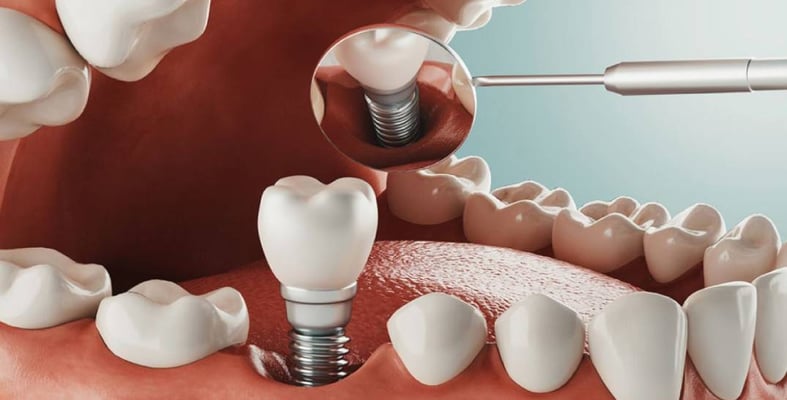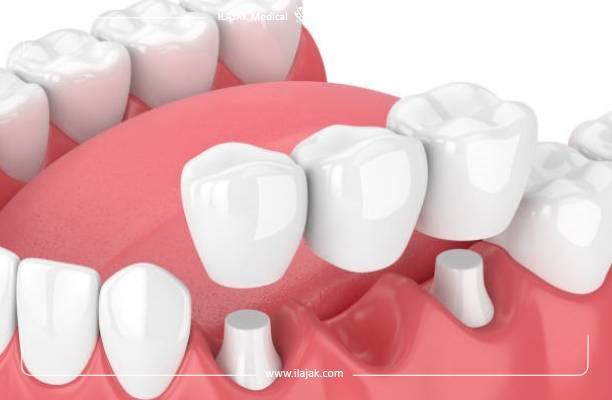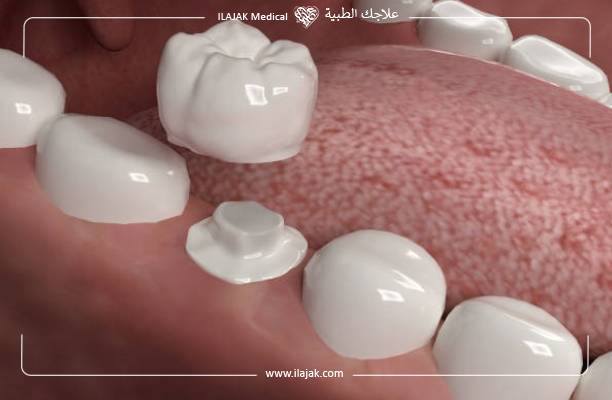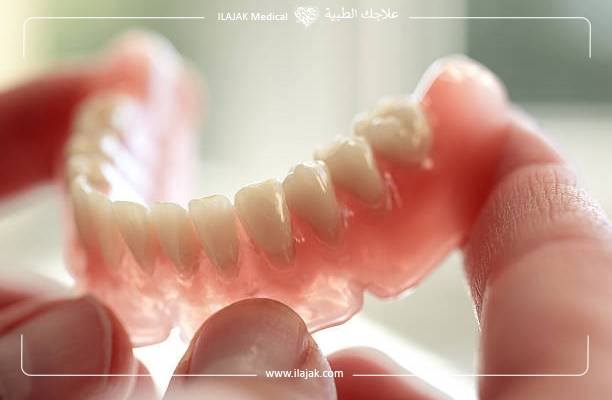4 common alternatives to dental implants

Table of Contents
What are common alternatives to dental implants?
Dental implants are the best way to compensate for lost and missing teeth. Dental implants help secure alternative and stable teeth with long life and do not cause complications or problems and do not require special care. But dental implants may not be suitable in some cases, and they may not be the best alternatives available as well.
A variety of alternatives to dental implants are available, including:
1. Dental bridge
Dental bridges are a set of dental crowns that are held firmly together.
Dental bridges are used to replace missing teeth and fill the space, bridges are fitted on the teeth adjacent to the missing one from each end.
Dental bridges are recommended when missing teeth are few.
What are the different types of dental bridges?
The dental bridges include mainly three types:
- The traditional fixed dental bridge is a replacement tooth supported by fixing it on the crowns of adjacent teeth.
- Maryland bonded bridge that is fixed by a metal or porcelain frame.
- Cantilever bridge that is fixed on one end only where there are no teeth on the other end.
Dental bridge advantages and drawbacks
Dental bridges have several advantages that make them preferable to dental implants, which include:
- Ease of installation of a dental bridge compared to dental implants
- Dental bridges are more suitable than dental implants in cases of missing one tooth or a few teeth
- Dental bridges are accomplished faster than dental implants and achieve nearly the same results in terms of function and form
- Dental bridges are significantly less expensive than dental implants
- Dental bridges do not require surgery, which saves the patient pain
The main disadvantages that hinder the use of dental bridges as alternatives to dental implants include:
- Dental bridges cannot be used to replace a large number of missing teeth
- The bridge may break and need to be replaced
- A dental bridge may weaken the adjacent teeth it is attached to due to the increased exposure of these teeth to pressure
- Improperly fitted dental bridges can lead to tooth decay, gingivitis, and difficulty cleaning teeth
2. Dental crown
Dental crowns are cap-like restorations made of porcelain, zircon, or ceramic that are used to cover teeth affected by large and deep caries or fractures and cracks, and dental crowns are one of the most acceptable options for restoring teeth.
Dental crown types
There are several types of dental crowns we have written about them previously we classify them according to the manufacturing material which includes:
- Gold crowns
Gold crowns are an excellent choice for patients who are not necessarily concerned about having an entirely white smile.
Gold crowns are, in fact, an attractive restoration and offer extended life. If you require a crown, speak to us about the different available crown options.
- Full ceramic crowns
All-Ceramic crowns are cosmetic dental restorations used to cap or cover a tooth.
They are translucent and are the most natural-looking tooth replacement, they are widely used.
- Porcelain fused to metal (PFM)
PFM crowns have good mechanical properties, satisfactory esthetic results, and an acceptable biological quality needed for periodontal health, and are most commonly used.
- Zirconium crowns
Zirconia is relatively new, they are made from zirconium dioxide, a white powdered ceramic material.
It combines the strength of metal with the aesthetics of ceramic crowns, recently becoming a more popular choice.
- E-max crowns
The newest type of crown in dentistry today is known as E-max, a special type of crown made from lithium disilicate material. Also, these crowns are made from a single block of this material which makes them a high-strength crown. Lithium disilicate is known for its superior strength and appealing aesthetics as a restorative crown material.
Dental crown pros and cons
Dental crowns have several advantages, including:
- Dental crowns help reduce discomfort and pain caused by dental problems.
- The process of installing dental crowns is simple and easy.
- Crowns are specially made to match the shape and alignment of each person's teeth.
- The shape of dental crowns is similar to the shape of natural teeth.
- Dental crowns last for a long time.
Disadvantages of dental crowns include:
- Dental crowns cannot be used when the tooth is completely lost, and therefore it is not the most suitable alternative to dental implants.
- Dental crowns can break or crack over time.
- Improperly positioned dental crowns can lead to cavities, gingivitis, and difficulty cleaning the area around the crown.
3. Dentures
Dentures are a good alternative to dental implants, and dentures are comfortable and have the same appearance as natural teeth.
Denture types
Dentures are available in several types, and the most prominent types of dentures include:
- Partial dentures are used to replace the loss of a few teeth and support the remaining teeth.
- Full dentures are used in cases of complete loss of teeth.
- Implant-supported dentures, which are held and supported by dental implants to improve bite function and stability of dentures.
Dentures pros and cons
Denture advantages include:
- Dentures are the best option in cases of tooth loss and the jawbone is not suitable for dental implants
- Dentures perform the functions of natural teeth such as chewing food and speaking and also have the same appearance as natural teeth
- Dentures are very comfortable and practical
- Dentures do not require surgery to be installed, which makes the installation of dentures easier and painless for the patient
Denture disadvantages include:
- The appearance of dentures, although it is close to the appearance of natural teeth, there is a noticeable difference.
- Dentures cannot be worn while sleeping.
- Dentures should be removed and cleaned frequently to keep them healthy and clean.
- In some cases, dentures may slide or move, making it difficult to eat or speak.
- Certain foods should be avoided when dentures are present.
4. Is doing nothing an option?
No, it’s not an option because teeth loss has serious consequences such as jawbone loss, gum diseases poor eating habits aesthetic concerns, and self-esteem issues.
That is why lost teeth should be immediately restored to avoid harmful consequences.
When to consider an alternative to a dental implant?
Situations in which dental implant alternatives can be used include:
- Loss of one tooth or a few teeth.
- Inadequate jaw bones for dental implants due to deterioration or wear of the jaw bones.
- Having diabetes, where it is not possible to heal the gums after surgery.
- The high cost of dental implants and the patient's inability to afford them.
How to choose the best alternative?
Several factors help determine the best way to replace missing teeth, including mainly the age of the patient, the number of missing teeth, the condition of the remaining teeth, the condition of the jawbones, and the patient's financial ability.
Dentures are preferred by the elderly, while dental bridges or dental crowns are preferred by the youngest if appropriate. However, it is better to leave the decision to the dentists cause they can evaluate your condition and choose the right option for you.
When is a dental implant the only option?
Dental implants may be the only option in some cases, and these cases include:
- Loss of all or a large part of the tooth, with the patient's condition not being suitable for dentures
- Tooth loosening and lack of healthy teeth to install bridges and partial dentures on them
- Complete loss of teeth at a young age
Are dental implants always the best option?
Dental implants are not always the best option.
Dental implants require two surgeries to install the implants, in addition to waiting for long periods for the gums to heal, which may be harmful or tiring for the patients or not suitable for their health condition when the patients have diabetes.
Dental implants are also expensive, and some patients cannot afford them.
It is necessary to consult with the dentist well and conduct a comprehensive and detailed evaluation before choosing a dental prosthesis method, to determine the best method and avoid the problems that can result from choosing an inappropriate method.
ILAJAK Medical | A Passion for Care



Treatment Services
In the Best Medical Centers
Contact Us
Please fill the form below and describe your condition, We will contact you back
- Dental Treatment
- Hair Transplant
- Obesity Surgery
- Vision Correction
- Health Resorts
- Other Medical Services
- No elements found. Consider changing the search query.
- List is empty.
Your personal data is processed as indicated in the general statement text and by continuing, you explicitly consent to the processing




